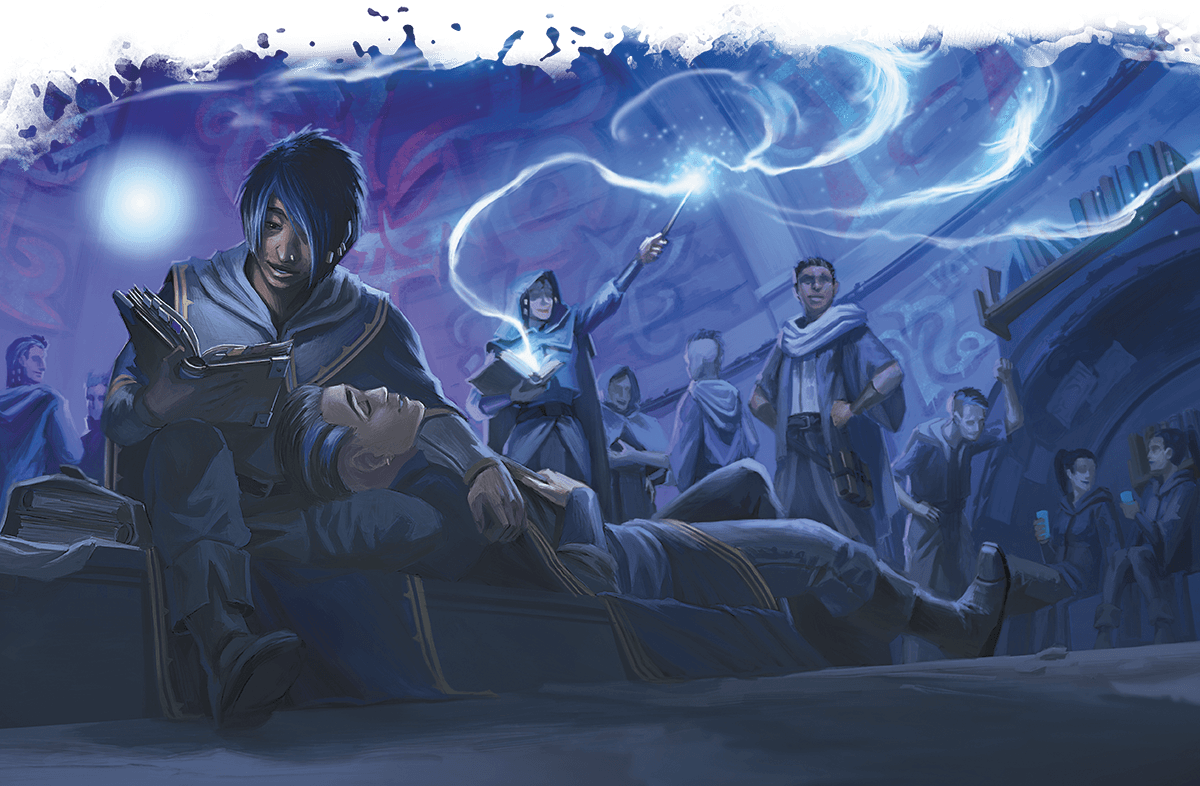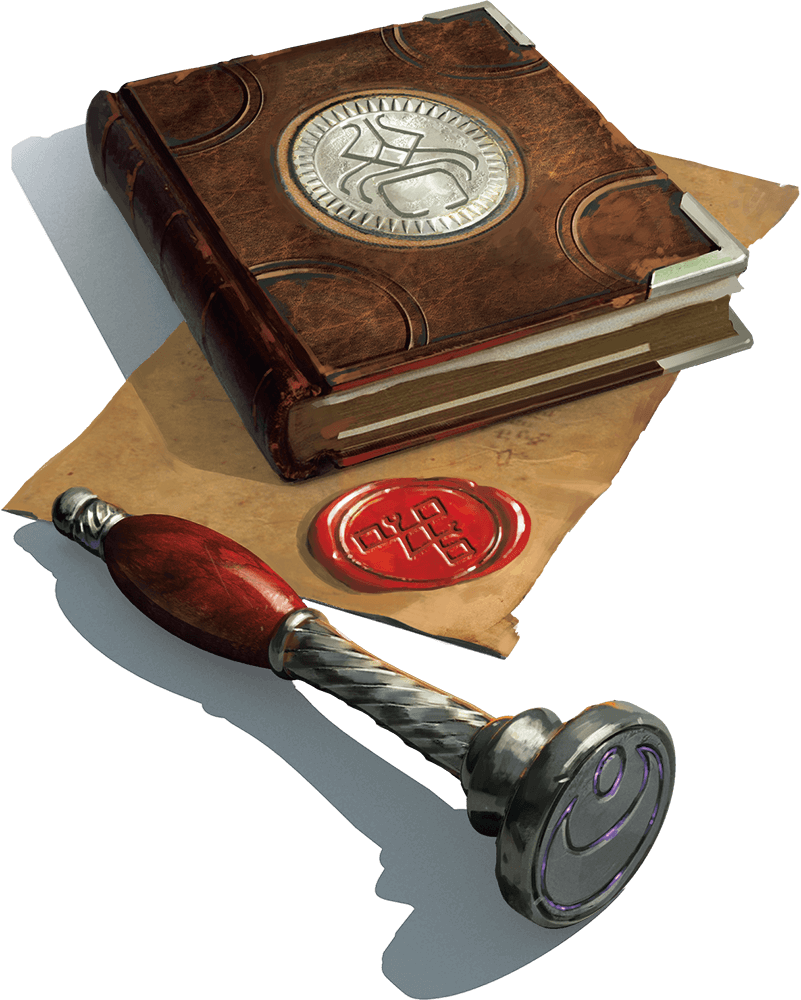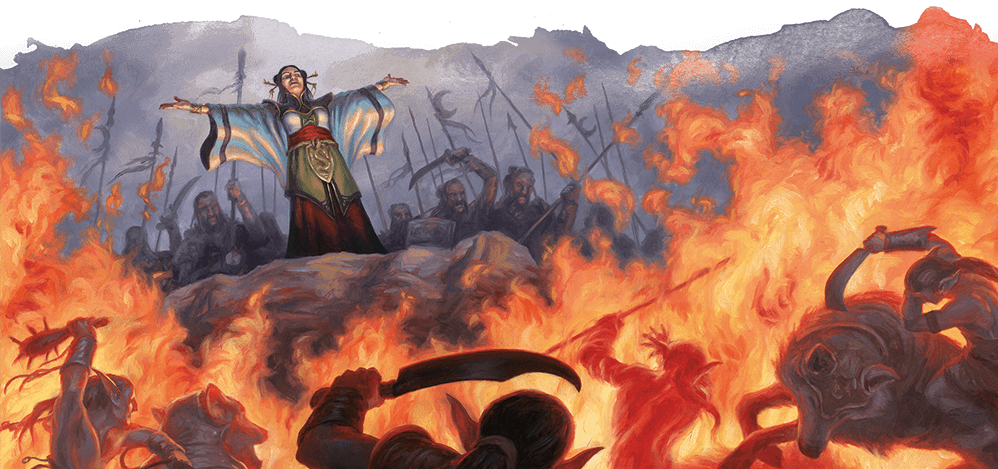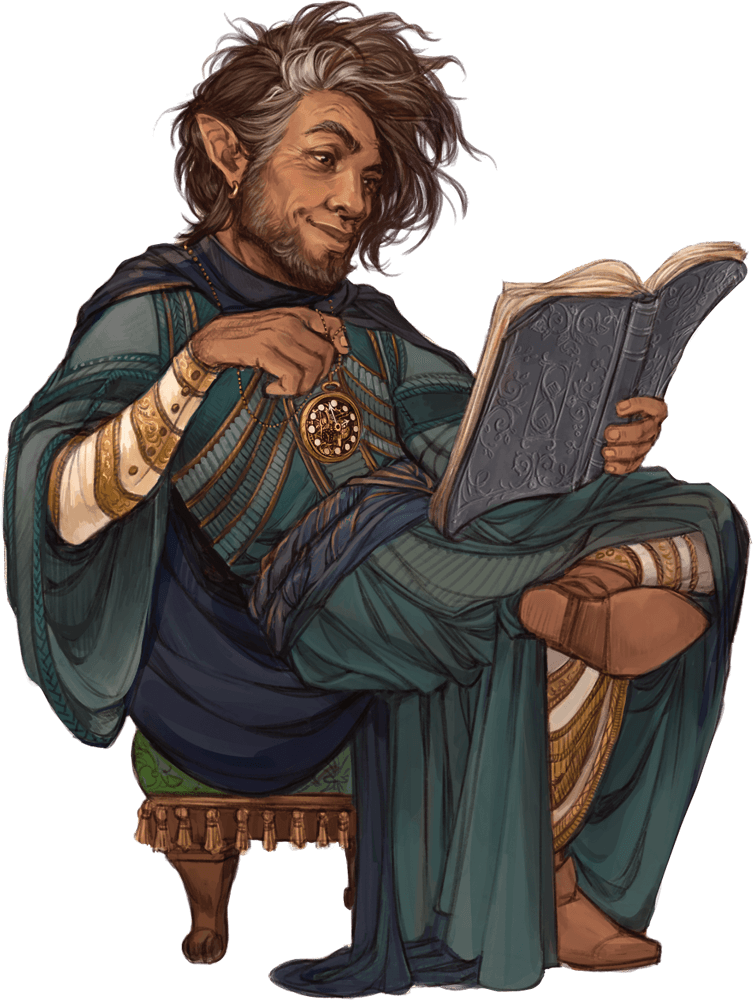“Books are a uniquely portable magic.”
-Stephen King
Wizards are without a doubt the most bookish class in Dungeons & Dragons. While other enchanters might receive their powers from bloodlines and eldritch patrons, wizards fill out their spell slots the old-fashioned way - through careful study and transcription of the printed page.
While there may be flashier schools of wizardry in D&D, if you’re someone who loves the image of an elderly magus who’s so fond of his spell tome that he actually managed to create a spectral version of it to fight alongside him, then a certain Arcane Tradition from Tasha’s Cauldron of Everything is perfect for you - particularly with this week’s release of Candlekeep Mysteries, a collection of adventures featuring the grandest library of the Forgotten Realms as a hub.
In other words, there’s no better time to hit the books and experiment with the Order of Scribes.

Order of Scribes features
Order of Scribes wizards specialize in quickly copying spells into their spellbooks, modifying spell damage types, gaining tactical advantage during combat or exploration, crafting spell scrolls, and surviving lethal blows by sacrificing bits of their magic.
- They gain two level 2 abilities. The first of these, Wizardly Quill, grants the wizard a magical quill that doesn’t require ink and can copy down spells at 2 minutes per spell level. Normally, wizards must spend a whopping 2 hours per level copying a spell, which forces this activity to be done in the downtime before or after a long rest. The Order of Scribes wizard faces no such problem, and could potentially scribble down the most potent magics from an enemy archmage’s stash in the middle of a dungeon crawl while the rest of the party stays alert.
- Their second level 2 feature, Awakened Spellbook, causes a sentience to emerge in the wizard’s spellbook. The wizard can now use the book as an arcane focus and cast spells as rituals using their normal casting time. They can also quickly replace their spellbook after a short rest without spending odious amounts of time and gold. (I played in an Out of the Abyss game with a gnome wizard who lost his spellbook after a drow battle and would’ve killed for this feature.) But the grand slam here is the ability to temporarily replace a spell’s damage type with another you possess that’s of the same level. (So no cantrips allowed.) More on this later, but yes, this does mean that if you cast the level 4 spell Ice Storm and have Sickening Radiance (also level 4) in your spellbook, you can shoot icicles that do radiant damage.
- Manifest Mind is the Order of Scribes level 6 ability. With this, the wizard can summon the mind of their Awakened Spellbook, getting something that’s a cross between a familiar and the Arcane Eye spell that possesses darkvision, can scout up to 300 feet ahead, and is intangible and impervious to damage. (It can disappear if hit with a Dispel Magic spell, though.) Best of all, the wizard can cast spells from the spectral mind’s space a number of times equal to their proficiency bonus. This grants the wizard a tremendous degree of mobility and range, meaning they can certainly bombard a den of undead from 300 feet away with those aforementioned radiant icicles if the occasion calls for it!
- The 10th level Order of Scribes feature is Master Scrivener, which lets the wizard pump out a scroll for level 1 or 2 spells after a long rest like a humanoid printing press. These scrolls are enhanced and count as one level higher than normal when used. Essentially, this gives the wizard a potentially endless array of magics that can be relied upon in a jiffy for the sake of reserving spell slots, and it’s a good idea to make this scroll creation process a daily ritual for any character choosing this Arcane Tradition.
- One With The Word is the final ability obtained at level 14. It grants an advantage on all Intelligence (Arcana) checks and allows the wizard to use a reaction to have their spectral mind absorb all damage from a blow. The mind will immediately vanish, and 3d6 must be rolled in what amounts to a potentially unpredictable outcome where the spellbook will temporarily lose spells of your choice that have a combined level equal to that roll or higher. (For instance, if the 3d6 roll is 6, you could dismiss one 6th level spell, two 3rd level spells, or some other combination.) The lost spells can be cast again once the wizard finishes 1d6 long rests. All in all, One With The Words carries risky consequences, but when you’re hit with a Beholder’s Disintegration Ray, this feature will definitely come in handy.
Benefits of the Order of Scribes
If nothing else, Order of Scribes wizards are versatile. They circumvent several of the busywork restrictions that plague other Arcane Tradition practitioners, such as the hefty time required to copy down new spellbook entries. While they’re not exactly tanks, they can take more than a few hits and remain standing thanks to One With The Word, and their ability to cast magic from afar via Manifest Mind and swap around damage types will surely appeal to D&D tinkerers who love crafting efficient character builds, tactically assessing a battle map and figuring out potent magic combos.
This degree of customization also extends to the Manifest Mind feature, which offers a myriad of roleplaying possibilities. The rules in Tasha’s Guide to Everything state that the mind resembles a ghostly tome, a cascade of text, or a scholar from the past, but generous DMs might be willing to have their players create an appropriate form that ties into a character’s backstory. Perhaps, for example, the mind could take on the appearance of the wizard’s long-departed spouse, representing the eternal connection of two hearts united as one.
Drawbacks of the Order of Scribes
The Order of Scribes tradition has been called niche by some, largely because its skill set is designed to thrive in a campaign that features varied foes with unusual resistances, as well as one that actually follows D&D’s rules when it comes to the time limits required for casting spells as rituals and copying down magic. If your DM is one who handwaves such minutiae, be aware that some of this Arcane Tradition’s more nuanced capabilities may remain on the back burner. If you’re also fearful of temporarily losing spells, the swingy nature of One With The Word may also seem like an underwhelming 14th level ability.
Some D&D fans who keep up with Unearthed Arcana have also critiqued the Order of Scribes as unoriginal, mostly because it’s a remix of a now-scrapped subclass for the Artificer known as the Archivist. Others prefer the more powerful Unearthed Arcana rules for the Order of the Scribes’ Awakened Spellbook, since they enabled players to swap a spell’s damage type with that of any spell in their spellbook - whereas the finalized rules restrict this to a spell of the same level.
Spells
Playing an Order of Scribes mage is all about amassing as many damage types as you can. The Awakened Spellbook text specifically states that you’re allowed to replace a spell’s damage type with one that appears in another spell of the same level, indicating that as long as it shows up in the spell’s text somewhere, you’re good to go. Keeping that in mind, here are some useful loadout possibilities from the Player’s Handbook, Xanathar’s Guide to Everything, and Tasha’s Cauldron of Everything.
As a reminder, D&D’s 13 damage types include acid, bludgeoning, cold, fire, force, lightning, necrotic, piercing, poison, psychic, radiant, slashing, and thunder.
- 1st Level spells: Chromatic Orb (acid, cold, fire, lightning, poison, thunder), Catapult (bludgeoning), Ice Knife (piercing), Magic Missile (force)
- 2nd Level spells: Cloud of Daggers (slashing), Dragon’s Breath (acid, cold, fire, lightning, poison), Dust Devil (bludgeoning), Phantasmal Force (psychic), Shatter (thunder)
- 3rd Level spells: Erupting Earth (bludgeoning), Glyph of Warding (acid, cold, fire, lightning, thunder), Spirit Shroud (cold, necrotic, radiant), Summon Undead (necrotic, poison)
- 4th Level spells: Blight (necrotic), Elemental Bane (acid, cold, fire, lightning), Ice Storm (bludgeoning, cold), Mordenkainen’s Faithful Hound (piercing), Phantasmal Killer (psychic), Sickening Radiance (radiant)
- 5th Level spells: Bigby’s Hand (bludgeoning, force), Cloudkill (poison), Cone of Cold (cold), Dawn (radiant), Enervation (necrotic), Immolation (fire), Transmute Rock (bludgeoning)
- 6th Level spells: Chain Lightning (lightning), Investiture of Flame (fire, cold), Investiture of Stone (bludgeoning, piercing, slashing), Sunbeam (radiant), Tasha’s Otherworldly Guise (fire, poison, radiant, necrotic)
- 7th Level spells: Crown of Stars (radiant), Finger of Death (necrotic), Prismatic Spray (acid, cold, fire, lightning, poison), Whirlwind (bludgeoning)
- 8th Level spells: Feeblemind (psychic), Illusory Dragon (acid, cold, fire, lightning, necrotic, poison) Sunburst (radiant)
- 9th Level spells: Blade of Disaster (force), Prismatic Wall (acid, cold, fire, lightning, poison), Weird (psychic)
This list doesn’t take into account the non-wizard spells and damage types that might become accessible if you’re following D&D’s multiclass rules. (Check out our How to Multiclass for Beginners article for more info!)
Speaking of multiclassing, one combination that’s achieved notoriety on the internet is an Order of Scribes Wizard who takes two levels of Tempest Cleric, giving them the ability to deal maximum Thunder or Lightning damage to an enemy once per short rest via Channel Divinity. Considering the damage swapping capabilities of the Order of Scribes, this could either be a match made in heaven or insanely overpowered, depending on whether you’re a player or a DM!
Feats
To supplement the Order of Scribes’ skillset, consider the following feats, which can add magic from other classes to your disposal without relying upon multiclassing or increase the wizard’s mobility and hardiness.
- Elemental Adept - This feat will let your spells ignore resistance to a certain damage type - acid, cold, fire, lightning or thunder - and also lets you treat any 1 on a damage die as a 2. This can be handy if you need to swap the damage type of a certain spell but don’t have anything prepared in your spell slots that’s of the same level.
- Eldritch Adept - To amplify the versatility of the Order of Scribes wizard, why not dip into the Warlock’s magic pool? Invocations like Eldritch Sight, which lets you cast Detect Magic at will, can be fantastic for conserving spell slots for those big damage swapping attacks that you specialize in.
- Fey Touched - Learning Misty Step for free and an additional 1st level spell - both of which can be cast once per long rest without expending a spell slot - is immensely useful, especially if you decide to use your spellbook’s spectral mind for scouting purposes and need to quickly teleport to its side.
- Magic Initiate - This feat will give you two cantrips from the bard, cleric, druid, sorcerer, or warlock spell lists, and even though cantrips can’t benefit from Awakened Spellbook, they’re still great to have. Plus, you get an extra 1st level spell to go along with them!
- Shadow Touched - Similar to Fey Touched, this lets you learn Invisibility for free and an additional 1st level spell that can be cast once per long rest without expending a spell slot. Imagine staying unseen to all as you unleash your magics from the space of your spectral mind. Who said that wizards can’t act like rogues?
- Telekinetic - This is an interesting choice that gives you an invisible Mage Hand and also lets you telekinetically shove one creature you can see within 30 feet. Once again, this supplements the Order of Scribe’s high mobility and can even serve as a unique way to maneuver allies around the battlefield.
- Warcaster - Warcaster’s just an easy choice for all wizards, letting them have an advantage on Constitution saving throws to maintain concentration and granting the ability to cast a spell as a reaction when attacks of opportunity are provoked.
The Order of Scribes wizard is one who trusts in the power of the book and knows that the quill is mightier than the sword. Consider playing this unique Arcane Tradition in the just-released Candlekeep Mysteries - for who better than a scribe to investigate the enigmas that lurk within mysterious grimoires?
For more on wizards, be sure to check out our overview of wizardly traditions in Wizard 101: A Beginner’s Guide to the Arcane Arts, as well as our in-depth looks at the School of Abjuration and the School of Evocation. And if you’d rather play another class, our entire Class 101 series is at your disposal.
Jeremy Blum (@PixelGrotto) is a journalist, gaming blogger, comic book aficionado, and fan of all forms of storytelling who rolled his first polyhedral dice while living in Hong Kong in 2017. Since then, he's never looked back and loves roleplaying games for the chance to tell the tales that have been swirling in his head since childhood.












-
View User Profile
-
Send Message
Posted Mar 27, 2021Like What? Perhaps you'd care to enlighten us, since you have such strong feelings where few others are seeing any issue.
-
View User Profile
-
Send Message
Posted Mar 28, 2021Disintegrate as a 6th level spell would give you force damage as well as just being a rather strong spell.
-
View User Profile
-
Send Message
Posted Mar 28, 2021-
View User Profile
-
Send Message
Posted Mar 28, 2021The order of the scribes is a nice enough subclass, but still feels cobbled together from a thematic perspective. I really wish they had continued to tweak(/nerf) the UA Loremaster rather than shove the Archivist subclass into Artificer, yank it out, slap a new coat of paint on it, and then make it a wizard subclass. The manifest mind feature is an oddly shoehorned thing that the subclass forces on you, when the rest of its theme and features are much more general and fit the vibe of "PhD-like scholar of lore and the arcane, when those who fall for the trap of focusing on one school or the other are undergrads". A subclass that leaned into the technical side of the arcane would've been great, and this one comes close, but at the same time is so far away from that concept.
-
View User Profile
-
Send Message
Posted Mar 28, 2021I really like this subclass.(also, great article)
-
View User Profile
-
Send Message
Posted Mar 28, 2021Sorry i dont quite understand the first point. Could you possibly clarify what you mean?
-
View User Profile
-
Send Message
Posted Mar 28, 2021Um...Sorry, your comment came right after my question asking another user what they thought was one of the ways this arcane tradition was broken, and I think I misinterpreted your post as a response. Based on your confusion, I'm guessing it was a totally separate comment, simply pointing out one of the possible benefits. Please, carry on; I'll just go hide my head under the bed covers in embarrassment.
-
View User Profile
-
Send Message
Posted Mar 28, 2021From the article:
"This list doesn’t take into account the non-wizard spells and damage types that might become accessible if you’re following D&D’s multiclass rules. (Check out our How to Multiclass for Beginners article for more info!)"
"Speaking of multiclassing, one combination that’s achieved notoriety on the internet is an Order of Scribes Wizard who takes two levels of Tempest Cleric, giving them the ability to deal maximum Thunder or Lightning damage to an enemy once per short rest via Channel Divinity. Considering the damage swapping capabilities of the Order of Scribes, this could either be a match made in heaven or insanely overpowered, depending on whether you’re a player or a DM!"
Is the implication here that the Order of Scribes (OoS) Wizard/Tempest Cleric multiclass-combo one that could substitute the lightning or thunder damage for another damage type because your character is an OoS Wizard?
Looking at the Tempest Domain Cleric Channel Divinity feature, it states:
Channel Divinity: Destructive Wrath
Starting at 2nd level, you can use your Channel Divinity to wield the power of the storm with unchecked ferocity.
When you roll lightning or thunder damage,(emphasis: mine) you can use your Channel Divinity to deal maximum damage, instead of rolling.
The thought of being able to substitute force damage (which nothing has resistance to) for thunder or lightning damage to do maximum damage - even if it is only once per long rest - is intriguing. However, under the Awakened Spellbook 2nd level OoS class feature, the description states:
The intent here limits the damage-swapping capability of the OoS Wizard class to those that are actual spells within your spellbook of the given level. As the Tempest Cleric limits the scope of the Destructive Wrath to those two specific damage types, I am not seeing a potential connection synergy with this multiclass build with respect to swapping out damage types. I don't see how any multiclass character could utilize their damage swapping capabilities granted by the OoS Wizard with any other spell casting class, as the caveat for the OoS Wizard is a spell from your spellbook.
Am I looking at this incorrectly?
-
View User Profile
-
Send Message
Posted Mar 28, 2021There is some synergy. For example, if you were at least Wizard 5 (Order of Scribes) + Cleric 2 (Tempest Domain) and had fireball as a prepared wizard spell with, e.g., glyph of warding in your spellbook, you could use your Awakened Spellbook to cast a "thunderball" (a fireball that does 8d6 thunder damage) and apply Destructive Wrath to maximize the damage (automatic 48 thunder damage, 24 with save). At that caster level (7 total), you could cast three 3rd-level spells before needing a long rest, while Channel Divinity: Destructive Wrath would be usable again after only a short rest -- so you could potentially cast three max damage "thunderballs" per long rest.
But, even without Order of Scribes, you would be able to cast three max damage lightning bolt spells per long rest.
-
View User Profile
-
Send Message
Posted Mar 28, 2021Thank you, I think I was looking at this bass ackwards!
-
View User Profile
-
Send Message
Posted Mar 28, 2021👍👍👍
-
View User Profile
-
Send Message
Posted Mar 28, 2021how many times can a wizard of the order of sribes change the spell damage is it once per day or 1 for the first cast of the spell ( cast burning hands make it force with magic missile and then do shatter with acid from acid arrow)
-
View User Profile
-
Send Message
Posted Mar 28, 2021You can do it every time you use a spell slot to cast a spell that deals damage.
-
View User Profile
-
Send Message
Posted Mar 29, 2021I have been gearing up to play an Order of Scribes wizard (core idea and backstory came to me the first time I read the UA), and this was such a great read after hunting for anything positive about the subclass. Most of the commentary and theory-crafting around the sub-class has said you need to multiclass with tempest, or that it's not worth it to play at all. That Wizards had over cooked it and limited it too much, or only offered solutions to problems that don't exist. It was disheartening to not find much positive commentary on it at all.
Some of that surprised me since the games I have been in followed the usual rules you mentioned that may not matter as much in other games.
Often the commentary is that either the skills are useless or the old standby of the theory-crafters "highly situational". Maybe it is more situational, but I think some of that just talking to your DM and fellow players about what you're going for and the contrast with the more standard issue Wizard. I mentioned the concern that more of my known spells would go to fueling type swaps over utility to both the DM and the other players. The DM in previous games has always been good about throwing spell scrolls in with the loot, and assured me they would still be available in this new game. The players were all working on their characters at the same time, and most were on board with that approach since several others could handle more of the utility.
Also, thanks for the great addition of the spell list! I was working on something similar after realizing that level one really opens up just from having something like chromatic orb in the list. Dragon's breath, Glyph of Warding, Elemental Bane, were all on there just to get a good source for multiple types at a lower cost to the spells known.
-
View User Profile
-
Send Message
Posted Mar 29, 2021Being able to bypass any weakness or immunity with no limit. Even the sorcerer need to spend sorcery points, and they're the ones who most need it. It allows them to as one example cast a fireball that deals force damage. For starters force damage is a damage very rarely resisted, and only a few select monsters are immune. Now the spell fireball is better than the normal level 3 aoe spell. It deal 8d6 rather than 6d6. This is balanced out by the fact that many monsters are resistant or immune to fire damage. So suddenly you have a spell that deals better than average damage, and is almost impossible to resist. All that without any cost beyond that of a normal fireball. How is that balanced?
-
View User Profile
-
Send Message
Posted Mar 29, 2021To some extent, I would agree. But bear in mind that there are few spells with force to even add to your spellbook. I don't see any third level spells that mention force damage; in fact, it appears that 2nd through 4th level are pretty much a wasteland for force damage, so you'd have to be able to cast fifth level spells before you would be able to convert fireball damage to force damage---meaning at least a 9th level wizard for 10d6 damage (and still no force swapping when expending a 3rd or 4th level spell slot).
Meta-gaming is always a problem, which is why I would encourage any DM to throw in occasional variant resistances for creatures. Changing the damage type is less useful if the players don't know what kind of resistance a creature has. That said, I did also mention previously that I personally would implement a limit on the number of uses per long rest--perhaps usable a number of times equal to the character's proficiency score, and then combine that with the ability to cast rituals without extended casting time, so they would be able to make more use of the latter feature but would have to balance the use of the two. I do think this archetype (like many) needs minor tweaking; but I don't believe it's broken to the same extent that some other archetypes are.
-
View User Profile
-
Send Message
Posted Mar 29, 2021This subclass and the chrono / graviturgy mages are my faves. I'm using this subclass to multiclass with the Eldritch Knight in Avernus.
-
View User Profile
-
Send Message
Posted Mar 29, 2021When you're going up against a creature without Resistance / Immunity, this does what? When the anti-spell defense is good saves, AC, or counterspell, this does what? How is this significantly different from Elemental Adept ignoring Resistance, given how few creatures have Immunity? Exactly. You're saying that a class with a ability that covers a specific niche covers that niche. Outside that niche, it's a way to flavor your spells a bit, and that's it. It's only a serious issue if the GM's one & only response to casters is to give the opposition Resistance or Immunity to the spells you commonly cast. What do they do when non-Scribes cast Lightning Bolt instead of Fireball? Is the entire encounter now a blow-out because the bad guys only had Resistance to fire?
-
View User Profile
-
Send Message
Posted Mar 30, 2021I would argue that the availability of force damage isn't all that important for Order of Scribes. If you have access to several different damage types at a particular level, chances are that one of them will work against whatever it is you're fighting at the moment.
I agree, however, that this subclass, while useful, doesn't seem as overpowered as some people are saying it is.
-
View User Profile
-
Send Message
Posted Mar 30, 2021The benefit of the feature actually isn't so much swapping damage type, it's saving on prepared spells; you only need to prepare one damage spell per level with the highest damage output, or the rider effect that you find most beneficial, then to gain additional damage types you only need to know the spells you want to swap from. So the big benefit of Awakened Spellbook is that you're saving on prepared spells, giving you room for more utility spells.
There is a discussion in the forums about whether you can also use this feature to change damage resistances/immunities, but I highly doubt that that's an intended feature (and somewhat disallowed in RAW), as I think that definitely would be OP from certain levels.